At first glance, GenAI like ChatGPT may seem like a miracle solution to expensive and time-consuming SEO tasks such as content creation.
Pop in a topic, provide some guiding parameters, and voila! Instant content.
Adding to the temptation to utilize generative AI is the nagging fear of falling behind competitors who adopted the technology more quickly. On the other hand, many enterprise SEOs worry about the potential risks of using this relatively new technology–especially at scale.
To address the top concerns voiced by enterprise brands about using generative AI for content marketing, we’ve drawn from our experience working with thousands of them and as early adopters of genAI ourselves.
Here’s what we’ll cover in this post:
- Will Google Accept AI-Generated Content?
- Duplicate Content Concerns With GenAI
- Plagiarism Concerns Regarding Generative AI
- The Security and Privacy Risks of Using GenAI
- Inaccurate and Biased Information Produced By GenAI
-
Informational Query Traffic Will Decrease or Be Non-Existent
- Short-Lived Results as the Competition Catches Up
- High Initial Traffic From AI-Generated Content, But Low Conversions
- Concerns About Job Security For SEOs Following GenAI
Will Google Accept AI-Generated Content?
According to Google representatives like John Mueller, the official stance on using AI-generated content has shifted in the past year.
While their previous stance was against using AI-generated content, they have clarified that they prioritize quality content that is useful to users and appears to be written by qualified human beings no matter how it was produced.

If AI-generated content demonstrates E-E-A-T (expertise, experience, authoritativeness, and trustworthiness) then Google will not penalize it.
Despite this shift in stance, enterprise SEOs should not rush into producing AI-generated content without some careful consideration. It is important to ensure that the content created by artificial intelligence is of high quality, meets the needs of users, and was not simply created for the sake of producing content to rank in search.
Duplicate Content Concerns With GenAI
Many SEOs worry about whether publishing content generated by ChatGPT will result in duplicate content.
However, asking the same question twice in ChatGPT will result in slightly different responses. Since ChatGPT operates from a word-prediction probability algorithm, the technology doesn’t simply copy and paste identical content to each user who inputs a similar prompt.
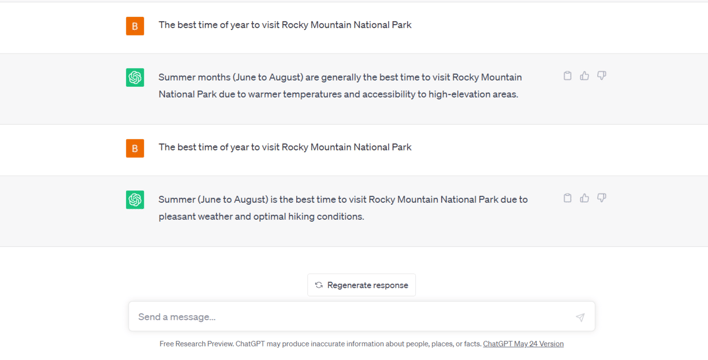
While it is possible for AI-generated content to become similar over time (after all, the model only has so much information to pull from), there is a creative aspect to it that makes each piece of content unique.
That being said, it’s important to note that the uniqueness of AI-generated content may also depend on the input data and the parameters set for the AI model. Therefore, it's essential to continue monitoring and assessing the content to ensure that it doesn't result in any duplicate content issues.
Plagiarism Concerns Regarding GenAI
There is a lot of concern about whether or not ChatGPT plagiarizes content.
The basic answer? When ChatGPT generates text it's always "creating" rather than copying content exactly from another source. That is, it works by predicting the most likely next token (word or group of words) based on the prompt and what they've already output to that point.
Here are some helpful free generative AI trainings to develop a stronger understanding of how the technology works.
That being said, if the topic is a simple or common one, just as with human writers, it may sound like other things that have been published. Ultimately, there are only so many ways to write about a generic topic. But ChatGPT never spits out word-for-word something it has "read."
Keep in mind that there is a much greater likelihood of content ending up similar to someone else's text if large language models are used without specific context and guardrails.
That’s why, at seoClarity, we’ve developed our generative AI-driven technology in a way that minimizes the risk of plagiarism. As outlined in our AI Manifesto, we are committed to the ethical and responsible use of AI with the goal of enhancing human capability rather than replacing it.
Here’s how we minimize the risk of plagiarism specifically in our technology:
-
Content Fusion, which facilitates AI-powered content creation, does not allow users to generate entire content pieces at once like many other point solutions do.
-
It only enables the ability to create short paragraphs around specific contexts such as headlines. If a user creates 10 paragraphs individually (instead of an entire piece at once), our testing shows the potential for plagiarizing someone else's text is greatly reduced.
-
In all of our interactions with clients and during training, we highlight that content generated through Content Fusion should be used as a starting point. Users should never copy and paste AI-generated content as-is. The brand knowledge, tone, creativity, and opinions of the human writer are the true differentiating factors that need to be inserted into any generated content.
The Security and Privacy Risks of Using GenAI
Following headlines about how ChatGPT leaked a company’s confidential data that had been entered into it, many SEOs became justifiably concerned about the security and privacy risks associated with using ChatGPT.
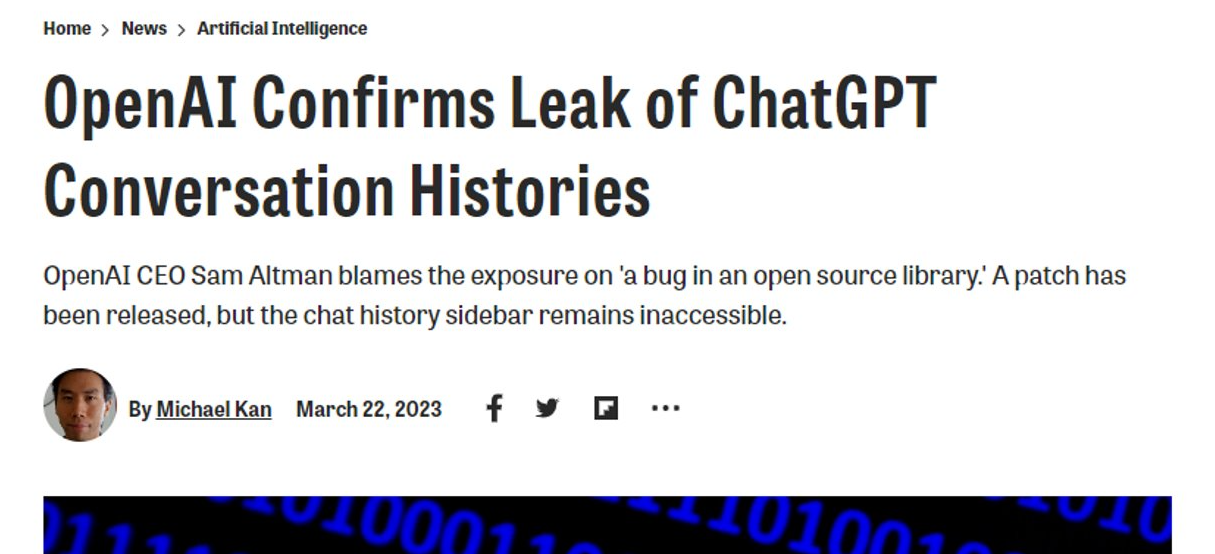
It’s essential to remember that anything you input into ChatGPT is retained and can be used for various purposes, including training and improving the model. If this data is not handled carefully, it can lead to a risk of confidential information being shared outside of the technology.
In addition, remember that the data stored in ChatGPT isn’t impervious to cybersecurity attacks. If hackers gain unauthorized access to the system, they could potentially access the data stored in it or use it to launch a more extensive attack on the organization. As such, it’s critical to avoid entering any sensitive information into the system.
In our own GenAI capabilities, we never use client data to train our models and ensure optimimum data confidentiality through a robust moderation layer. This secure AI data flow is illustrated through the diagram below:
 Check out our security page to learn more.
Check out our security page to learn more.
Inaccurate and Biased Information Produced By Generative AI
There is a growing concern about biased and inaccurate information in AI models, including ChatGPT.
The model is trained on vast amounts of data, and if this data is biased or incorrect, the model will also be biased and unreliable. This can have serious implications, particularly in applications where decisions are made based on the model's output.
As such, it’s critical not to take outputs from ChatGPT as truth. Always cross-check information from the model with trustworthy sources to ensure accuracy.
Informational Query Traffic Will Decrease or Be Non-Existent
As we’ve already experienced with Bing’s AI Chatbot, the search engine is moving towards answering queries rather than presenting a list of resources that “could” answer the query.
Google's release of AI Overviews has followed suit, providing AI-generated answers to queries without the searcher having to click on a website.
Recommended Reading: What’s Next for Google's Search Generative Experience?

Even so, it’s very tempting to hand over most or even all your content creation to AI generation because of the possibility of a massive increase in traffic.
This temptation increases as we see an influx of success stories by SEOs claiming to have generated an amazing boost in traffic after flooding their site with thousands of pages of AI-generated content.
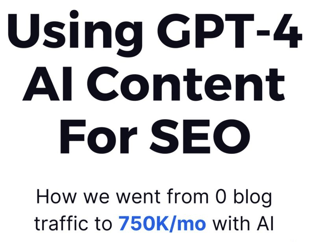
If more companies adopt the method of “quantity over quality” at a massive scale, traffic to all of those mass-generated pages will drop off significantly. Is it worth the effort to create thin content that will eventually hurt the overall quality rating of your website?
In addition, if much of this content is basic top-funnel information, search engines that incorporate AI technology will likely answer those queries right on the SERP–similar to how featured snippets or knowledge panels are today, just at a greater scale.
Recommended Reading: Generative AI's Impact on SEO
Short-Lived Results as the Competition Catches Up
While producing AI-generated content at scale may lead to immediate gains in traffic and visibility, it may not be sustainable in the long term.
Here’s why.
Large increases in organic traffic from mass-produced AI-generated content are likely attributed to the enormous coverage of frequently asked questions in a given industry.
But, this gain is likely to diminish when competitors start using the same technique and flooding their sites with similar content. This would cause Google to no longer feature just one site, and the long-tail traffic would begin to dry up.
Content marketing expert Mark Evans' post mirrors our concern about the risks associated with producing AI-generated content at scale:
In the short term, they have a competitive advantage. But what happens when every company adopts the same technology? That competitive advantage will quickly evaporate.
This hypothesis also explains why some keyword results are filled with spam or thin content. Google has to show something for those keywords because no one else has created better content for them, yet.
Therefore, relying solely on AI-generated content to gain an edge in SEO is not a sustainable strategy.
To achieve long-term SEO success, it is crucial to produce high-quality content that adds value to users and stands out from the competition.
High Initial Traffic From AI-Generated Content, But Low Conversions
When evaluating the use of AI-generated content for SEO, it is important to consider whether the content aligns with the business goals of the website.
Simply generating traffic and attracting visits is not enough if the content does not lead to conversions or meet the needs of the target audience.
While mass-produced AI-generated content may result in a significant initial increase in traffic, the content may not necessarily lead to conversions or attract visits in the future. And if the content isn’t built around your business goals, what value does the traffic it generates really have?
Therefore, it is important to not only consider the quantity of traffic that could be generated by AI-generated content but also the quality and relevance of the content to your target audience.
Concerns About Job Security For SEOs Following Generative AI
The launch of ChatGPT showed the world how generative AI could change the way we work. This has also led to concerns about job security for SEOs. However, it is important to note that technology continues to advance to enhance the work of SEOs and help them be more efficient.
For example, ChatGPT can help with SEO tasks such as:
- Expanding keyword research
- Freshening up titles and meta descriptions
- Optimizing images
- Improving product descriptions
- Conducting competitor research
- Even writing structured data code
And many, many more.
Recommended Reading: Ways to Use Generative AI for SEO
However, these tasks still require human oversight and strategy. SEOs can use AI to gather insights and recommendations, but ultimately, they are the ones making the decisions and implementing the strategies.
In fact, generative AI, like ChatGPT, can free up time for SEOs to focus on higher-level tasks such as analyzing data, developing strategies, and managing client relationships. This can lead to better results and ultimately, job security.
Overall, while AI may change the way SEOs work, it is not a threat to their career–unless they refuse to embrace it. Instead, it is a tool that can help them work more efficiently and strategically.
seoClarity's Framework for Enterprise AI
At seoClarity, we've developed a defined set of principles that guides our AI-driven innovations and developments. This is known as our AI Manifesto.
This framework includes 6 important tenants:
- We aim to augment human capabilities rather than replace them.
- We are committed to fostering fair competition and discouraging any form of unfair advantage gained through the misuse of AI technology.
- We adhere to industry best practices and comply with relevant regulations to protect user data.
- We firmly believe in respecting intellectual property rights and promoting originality.
- We are dedicated to continuous improvement and innovation.
- We will invest in both customizability of LLMs for each client’s purpose and control over how it is applied.
As enterprise AI continues to evolve, we will refine this framework to meet the evolving needs of our SEOs.
Conclusion
While AI-generated content helps scale SEO efforts, it is important to be mindful of the risks and potential drawbacks associated with using the technology—particularly when it comes to content generation at scale.
It may be beneficial to explore the various uses of ChatGPT and its sister technologies, but it is also important to proceed with caution and carefully evaluate the impact on SEO before scaling up the use of generative AI.
To start implementing GenAI into your SEO strategy safely and securely, learn about how SIA, our AI intelligent assistant, can streamline your workflows and accelerate results across all stages of SEO.
<<Editor's Note: This blog was originally published in May 2023 and has since been updated.>>




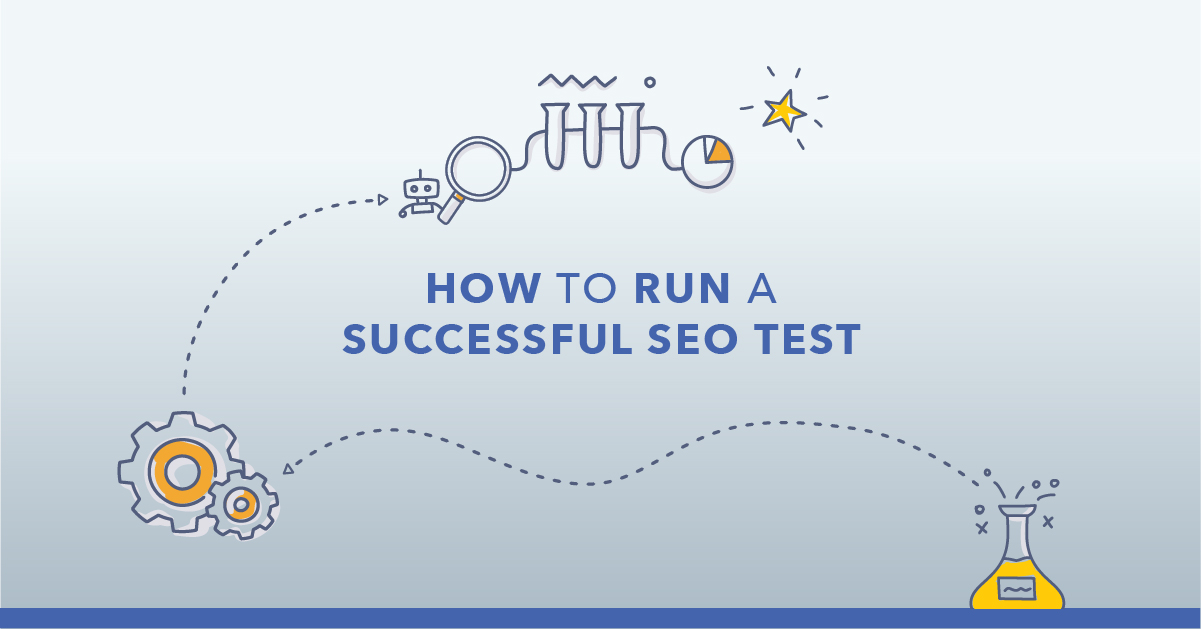
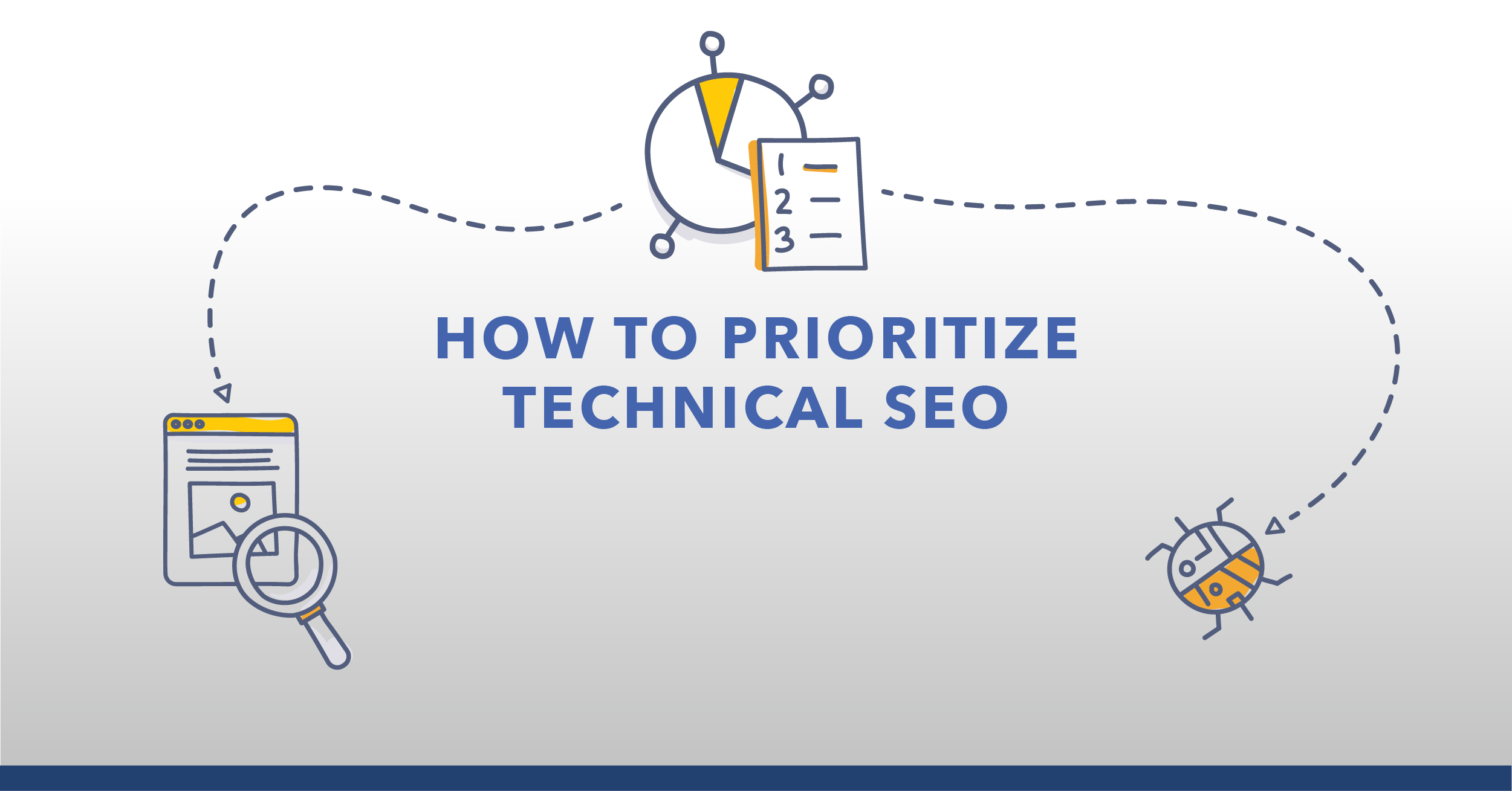

Comments
Currently, there are no comments. Be the first to post one!